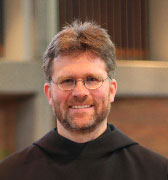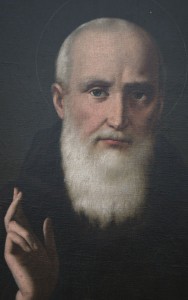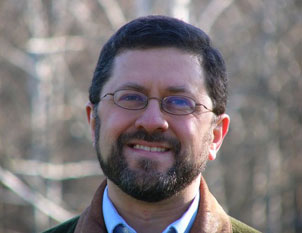Episode 33- The Holy Rule of St. Benedict: A Spiritual Path for Today’s World with Fr. Mauritius Wilde O.S.B.,  PhD.
PhD.
“The Life of St. Benedict pt 6”
We continue our conversation on the life of St. Benedict by using the biography penned by St. Gregory the Great.  In this episode St. Benedict deals with serious temptation.  If God calls you to restrain from something for the sake of His Kingdom, for the greater Love, this can include suffering and tension. We often try to avoid that.  St. Benedict desires to  be free and detached.  So Benedict takes action in order to be open to  grace and the love of God.   His method in this story may seem archaic to some, but it shouldn’t stop us from examining how we deal with temptation.
[powerpress]
From the Life of Our Most Holy Father St. Benedict by St. Gregory the Great:

 CHAPTER I.
The holy man being on a certain day alone, the tempter was at hand; for a little black bird, commonly called an ousel, began to fly about his face, and that so near as the holy man, if he would. might have taken it with his hand; but no sooner had he made the sign of the cross than the bird vanished. When presently so great a carnal temptation assailed him, that before the holy man had never felt the like. For the remembrance of a woman which some time he had seen, was so lively represented to his fancy by the wicked spirit, and so vehemently did her image inflame his breast with lustful desires, that almost overcome by pleasure, he was determining to leave the wilderness. But suddenly assisted with divine
grace he came to himself, and, seeing near him a thicket full of nettles and briars, he threw off his garments and cast himself naked into the midst of those sharp thorns and nettles, where he rolled himself so long, that, when he rose up, all his body was pitifully rent; thus by the wounds of his flesh he cured those of his soul, by turning pleasure into pain; and by the vehemence of outward torments he extinguished the unlawful flame which burnt within overcoming sin by changing the fire. After which time, as he himself related to his disciples, he was so free from the like temptation, that he never felt any such motion.
 For more information about the ministry of the the Missionary Benedictines of Christ the King Priory in Schuyler, Nebraska visit here:
For more information about the ministry of the the Missionary Benedictines of Christ the King Priory in Schuyler, Nebraska visit here:
This entry was posted on Thursday, December 4th, 2014 at 1:30 pm
You can follow any responses to this entry through the RSS 2.0 feed.
Episode 31- The Holy Rule of St. Benedict: A Spiritual Path for Today’s World with Fr. Mauritius Wilde O.S.B.,  PhD.
PhD.
“The Life of St. Benedict pt 4”
We continue our conversation on the life of St. Benedict by using the biography penned by St. Gregory the Great. This episode St. Benedict is visited a priest on Easter Sunday morning in the cave and is called from his seclusion.
[powerpress]
From the Life of Our Most Holy Father St. Benedict by St. Gregory the Great:

 CHAPTER I.
Now when it pleased Almighty God that Romanus should rest from his labours, and that the life of Benedict should be manifest to the world for an example to all men, that the candle set upon a candlestick might shine and give light to the whole Church of God, our Lord vouchsafed to appear to a certain Priest living far off, who had make ready his dinner for Easter Day, saying to him: “Thou hast prepared good cheer for thyself, and My servant in such a place is famished for hunger.†Who presently rose up, and on the solemn day of Easter went towards the place with such meat as he had provided for himself, where seeking the man of God, amongst craggy rocks, winding valleys and hollow pits he found him hid in a cave. Then after prayers, and blessing the Almighty Lord, they sat down, and after some spiritual discourse the Priest said: “Rise, and let us take our refection, for this is Easter Day.†To whom the man of God answered: “I know it is Easter, because I have found so much favour as to see thee.†(For not having a long time conversed with men, he did not know it was Easter Day.) The good Priest did therefore again affirm it, saying: “Truly this is the day of our Lord’s Resurrection, and therefore it is not fit that you should keep abstinence, and for this cause I am sent that we may eat together that which Almighty God hath bestowed on us.†Whereupon blessing God, they fell to their meat. Their discourse and dinner ended, the Priest returned to his Church.
 For more information about the ministry of the the Missionary Benedictines of Christ the King Priory in Schuyler, Nebraska visit here:
For more information about the ministry of the the Missionary Benedictines of Christ the King Priory in Schuyler, Nebraska visit here:
Tags: catholic, catholic podcast, catholic prayer, cathollc spirituality
This entry was posted on Tuesday, November 18th, 2014 at 12:22 pm
You can follow any responses to this entry through the RSS 2.0 feed.
Episode 29- The Holy Rule of St. Benedict: A Spiritual Path for Today’s World with Fr. Mauritius Wilde O.S.B.,  PhD.
PhD.
“The Life of St. Benedict pt 2”
We begin the reflection of the life of St. Benedict by using the biography penned by St. Gregory the Great. This episode continues the teaching on detachment, particularly from our earthly mothers.
[powerpress]
From the Life of Our Most Holy Father St. Benedict by St. Gregory the Great:

 CHAPTER I.
Benedict having now left the schools resolved to betake himself to the desert, accompanied only by his nurse who most tenderly loved him. Coming therefore to a place called Affile, and remaining for some time in the Church of St. Peter by the charitable invitement of many virtuous people who lived there for devotion, so it chanced that his nurse borrowed of a neighbour a sieve to cleanse wheat, which being left carelessly upon the table was found broken in two pieces. Therefore on her return finding it broke, she began to weep bitterly because it was only lent her. But the religious and pious boy, Benedict, seeing his nurse lament was moved with compassion, and taking with him the two pieces of the broken sieve, with tears he gave himself to prayer, which no sooner ended, but he found the sieve whole, and found not any sign that it had been broken. Then presently he restored the sieve which had been broken, whole to his nurse, to her exceeding comfort. This matter was divulged unto all that lived thereabout, and so much admired by all, that the inhabitants of that place caused the sieve to be hanged up in the Church porch, that not only those present, but all posterity might know with how great gifts of grace Benedict had been endowed from the beginning of his conversion. The sieve remained to be seen for many years after, and hung over the Church door even until the times of the Longobards.
But Benedict more desirous to suffer afflictions than covetous of praise; and rather willing to undergo labours for the honour of God, than to be extolled with the favours of this world, fled secretly from his nurse to a remote place in the desert called Subiaco, distant about forty miles from Rome, in which a fountain springing with cool and crystal waters, extendeth itself at first into a broad lake, and running farther with increase of waters becometh at the last a river.
 For more information about the ministry of the the Missionary Benedictines of Christ the King Priory in Schuyler, Nebraska visit here:
For more information about the ministry of the the Missionary Benedictines of Christ the King Priory in Schuyler, Nebraska visit here:
Tags: catholic, catholic podcast, catholic prayer, cathollc spirituality
This entry was posted on Saturday, October 4th, 2014 at 3:36 pm
You can follow any responses to this entry through the RSS 2.0 feed.
Episode 28- The Holy Rule of St. Benedict: A Spiritual Path for Today’s World with Fr. Mauritius Wilde O.S.B.,  PhD.
PhD.
“The Life of St. Benedict pt 1”
We begin the reflection of the life of St. Benedict by using the biography penned by St. Gregory the Great. This episode looks at the pivotal discernment he made as a young man to pursue the religious life. Â The aspect of detachment from our earthly family, particularly our earthly fathers, in favor of our Heavenly Father, is explored by Fr. Mauritius.
[powerpress]
From the Life of Our Most Holy Father St. Benedict by St. Gregory the Great:

INTRODUCTION.
THERE was a man of venerable life, Benedict by name and grace, who from the time
of his very childhood carried the heart of an old man. His demeanour indeed surpassing
his age, he gave himself no disport or pleasure, but living here upon earth he despised the
world with all the glory thereof, at such time as he might have most freely enjoyed it. He
was born in the province of Nursia of honourable parentage and sent to Rome to study the
liberal sciences. But when he saw there many through the uneven paths of vice run headlong
to their own ruin, he drew back his foot, but new-set in the world, lest, in the search of human
knowledge, he might also fall into the same dangerous precipice. Contemning therefore
learning and studies and abandoning his father’s house and goods, he desired only to please
God in a virtuous life. Therefore he departed skilfully ignorant and wisely unlearned.
 For more information about the ministry of the the Missionary Benedictines of Christ the King Priory in Schuyler, Nebraska visit here:
For more information about the ministry of the the Missionary Benedictines of Christ the King Priory in Schuyler, Nebraska visit here:
Tags: catholic, catholic podcast, catholic prayer, cathollc spirituality
This entry was posted on Thursday, September 18th, 2014 at 4:13 pm
You can follow any responses to this entry through the RSS 2.0 feed.
Bruce and I had a great conversation with Mike Aquilina about the great St. Benedict.
[powerpress]
Here is a teaching from another Benedict our Holy Father Pope Benedict XVI
St Peter’s Square
Wednesday, 9 April 2008
Dear Brothers and Sisters,
Today, I would like to speak about Benedict, the Founder of Western Monasticism and also the Patron of my Pontificate. I begin with words that St Gregory the Great wrote about St Benedict: “The man of God who shone on this earth among so many miracles was just as brilliant in the eloquent exposition of his teaching” (cf. Dialogues II, 36). The great Pope wrote these words in 592 A.D. The holy monk, who had died barely 50 years earlier, lived on in people’s memories and especially in the flourishing religious Order he had founded. St Benedict of Norcia, with his life and his work, had a fundamental influence on the development of European civilization and culture. The most important source on Benedict’s life is the second book of St Gregory the Great’s Dialogues. It is not a biography in the classical sense. In
accordance with the ideas of his time, by giving the example of a real man – St Benedict, in this case – Gregory wished to illustrate the ascent to the peak of contemplation which can be achieved by those who abandon themselves to God. He therefore gives us a model for human life in the climb towards the summit of perfection. St Gregory the Great also tells in this book of the Dialogues of many miracles worked by the Saint, and here too he does not merely wish to recount something curious but rather to show how God, by admonishing, helping and even punishing, intervenes in the practical situations of man’s life. Gregory’s aim was to demonstrate that God is not a distant hypothesis placed at the origin of the world but is present in the life of man, of every man.
This perspective of the “biographer” is also explained in light of the general context of his time: straddling the fifth and sixth centuries, “the world was overturned by a tremendous crisis of values and institutions caused by the collapse of the Roman Empire, the invasion of new peoples and the decay of morals”. But in this terrible situation, here, in this very city of Rome, Gregory presented St Benedict as a “luminous star” in order to point the way out of the “black night of history” (cf. John Paul II, 18 May 1979).
In fact, the Saint’s work and particularly his Rule were to prove heralds of an authentic spiritual leaven which, in the course of the centuries, far beyond the boundaries of his country and time, changed the face of Europe following the fall of the political unity created by the Roman Empire, inspiring a new spiritual and cultural unity, that of the Christian faith shared by the peoples of the Continent. This is how the reality we call “Europe” came into being.
St Benedict was born around the year 480. As St Gregory said, he came “ex provincia Nursiae” – from the province of Norcia. His well-to-do parents sent him to study in Rome. However, he did not stay long in the Eternal City. As a fully plausible explanation, Gregory mentions that the young Benedict was put off by the dissolute lifestyle of many of his fellow students and did not wish to make the same mistakes. He wanted only to please God: “soli Deo placere desiderans” (II Dialogues, Prol. 1). Thus, even before he finished his studies, Benedict left Rome and withdrew to the solitude of the mountains east of Rome. After a short stay in the village of Enfide (today, Affile), where for a time he lived with a “religious community” of monks, he became a hermit in the neighbouring locality of Subiaco. He lived there completely alone for three years in a cave which has been the heart of a Benedictine Monastery called the “Sacro Speco” (Holy Grotto) since the early Middle Ages. The period in Subiaco, a time of solitude with God, was a time of maturation for Benedict. It was here that he bore and overcame the three fundamental temptations of every human being: the temptation of self-affirmation and the desire to put oneself at the centre, the temptation of sensuality and, lastly, the temptation of anger and revenge. In fact, Benedict was convinced that only after overcoming these temptations would he be able to say a useful word to others about their own situations of neediness. Thus, having tranquilized his soul, he could be in full control of the drive of his ego and thus create peace around him. Only then did he decide to found his first monasteries in the Valley of the Anio, near Subiaco.
In the year 529, Benedict left Subiaco and settled in Monte Cassino. Some have explained this move as an escape from the intrigues of an envious local cleric. However, this attempt at an explanation hardly proved convincing since the latter’s sudden death did not induce Benedict to return (II Dialogues, 8). In fact, this decision was called for because he had entered a new phase of inner maturity and monastic experience. According to Gregory the Great, Benedict’s exodus from the remote Valley of the Anio to Monte Cassio – a plateau dominating the vast surrounding plain which can be seen from afar – has a symbolic character: a hidden monastic life has its own raison d’être but a monastery also has its public purpose in the life of the Church and of society, and it must give visibility to the faith as a force of life. Indeed, when Benedict’s earthly life ended on 21 March 547, he bequeathed with his Rule and the Benedictine family he founded a heritage that bore fruit in the passing centuries and is still bearing fruit throughout the world. (more…)
Tags: benedictines, catholic, catholic podcast, catholic prayer, cathollc spirituality, Europe, mike aquilina, Roman Empire, st benedict, st. paul center for biblical theology
This entry was posted on Friday, July 11th, 2014 at 5:02 am
You can follow any responses to this entry through the RSS 2.0 feed.
